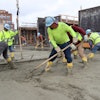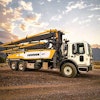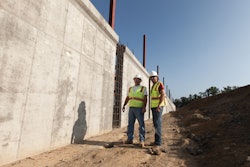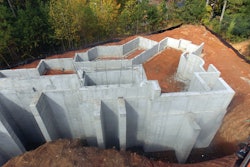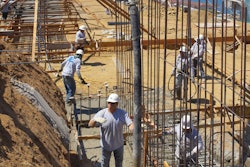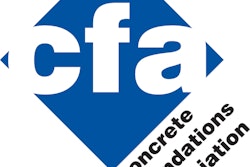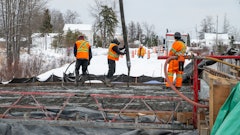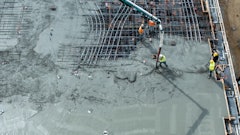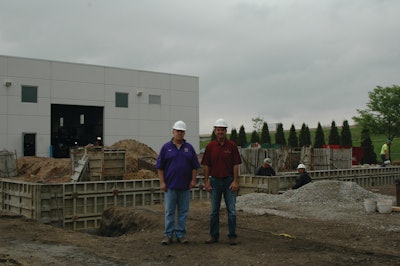
Earlier this year, Martinson Construction installed a GPS fleet tracking system on its trucks, pump trucks and skid-steer loaders. Despite a relatively short time frame with the system, the company is already seeing its value. “In the first week, we caught a couple of trucks that were idling two to three hours on a jobsite. The drivers said they forgot to turn them off,” relates Dave Martinson. “Since then, we’ve seen our trucks go right to the job and shut off. I don’t know if we had a problem with idling or extra stops before, but I know we don’t now.”
GPS fleet tracking is just one example of the tools and ideas Martinson Construction is implementing in an effort to become more efficient, and ultimately more profitable. The third-generation construction company, owned by brothers Dave and Scott Martinson, is also moving to cut back on lost and forgotten tools, stop unauthorized purchases, track equipment maintenance schedules, and write policies and procedures that help employees perform duties consistently.
“Five years ago, we didn’t have to worry about these issues. But material prices have gone up, and increased competition keeps us from increasing prices. We had to turn to technology,” Dave says.
While the company welcomes new technologies that help it complete tasks and work faster, Dave and Scott understand there are some things that can’t be replaced, namely the values on which their father and grandfather built the company — quality, customer service and dedication to its most valuable asset, its employees.
Background
Martinson Construction is a residential and commercial contractor in Waterloo, Iowa. It has 65 employees and runs three wall crews and four flatwork crews. Dave and Scott’s grandfather Vern Martinson started the company in 1950. Legend has it, Vern borrowed $200 to buy a mixer so he could build foundations as a brick and block mason. Dave and Scott’s father, Jerry, took over the business in the mid-1960s. Shortly thereafter, the cast-in-place basement movement made its way to Iowa, and Jerry embraced that change and moved the company into poured walls and concrete flatwork.
Dave and Scott started with the company in the 1980s. Dave’s interests naturally led him to the walls crew, while Scott’s interests led him to the flatwork side of the company. Martinson Construction does about 60 percent of its sales in walls, and 40 percent in flatwork. While its mix of residential, commercial and public work can fluctuate greatly year to year, its split between walls and floors is consistent.
Changing technology
When Dave and Scott started their construction careers, everyone was in the field. Eventually that changed. Dave says technology had a lot to do with it. “The computerization of estimating, billing and invoicing pushed us indoors,” he says. “And the volume of work simply required more office time.”
Martinson Construction had always sought out efficiencies. They utilize concrete pumping, total station layout, crane trucks to move their wall forms, and a laser-guided screed for flatwork — all equipment that takes some of the hardest work out of concrete construction. But a few recent software programs have moved the company to an even higher level of efficiency. One helps the company control costs on tools. “We felt like we were wasting too much money on tools. We were always getting calls from customers saying we left some equipment at their jobsite, then we’d have to take the time to go pick it up. And employees had too much freedom to run into the hardware store and buy tools. We wouldn’t know until we saw the receipt,” Dave explains.
The first attempt to control tool costs was with the Martinson Construction warehouse “store,” where workers can check out specialty tools they need for the day, like a total station or a hammer drill, or trade in an old piece of equipment or wear item for something new. The most recent control for cutting tools costs is with a tool-tracking system that utilizes barcodes and scanners to log where tools are and who has them. Dave explains there was always an expectation for employees to take care of tools, but there was no way to enforce those expectations. “We implemented a lot of rules over the years that weren’t enforceable because we didn’t have the tools to manage. Now we do,” he says.
Other technology systems include the GPS vehicle tracking system described earlier, which in addition to cutting down on excessive idling and “detours” to and from jobsites allows the office staff to track the company’s other equipment, like its pump truck or conveyor, in real time. A mobile payroll and job costing program works through employees’ smartphones. While automated payroll tracking isn’t new to Martinson Construction, the new system integrates automatically with the company’s accounting software. “It used to take 16 hours of office work to manually enter job costing information each week. Technology saved us time and made the system more accurate because it eliminated guessing,” Dave explains.
Dave emphasizes that while these technologies benefit the company’s bottom line, they help employees, too. Stronger profits for the company allow for better opportunities for its workers, with stable jobs and competitive wages. In the case of equipment technologies, it makes their jobs easier, too.
“Technology makes concrete a good career. It used to be back-breaking labor, but now it’s a career,” Scott Martinson says. “Employees are running equipment not traditionally used in construction, like lasers and laser-guided screeds.”
“Technology allows employees to stay with us longer,” Dave adds. “It allows them to do construction work as they get older.”
What won’t change
Many second- and third-generation construction companies undergo evolutionary changes when young minds and modern ideas enter a family business. At Martinson Construction, Scott, Dave and their dad worked to ensure the new ideas never compromised the company’s quality and customer service.
“Dad taught us to be expediters — to help people get things done, and get things done right,” Scott explains. The company sets grade height for basements and stakes out basements. “We don’t charge for it, but it separates us from our competition. It’s a service to our customers, and it expedites our jobs, too. If we do it, there is no waiting around for someone else to do it. And we know it was done right.”
Another service the company offers is free and fast itemized estimates, which they will turn around in an hour if asked to do so. A well-planned procedure everyone follows for estimates allows them to meet such a challenging request.
“We are problem solvers. Builders ask us what they should do if they have an issue or questions,” Dave says. That trust is important, especially in the demanding homebuilding market. “With builders, you’re only as good as your last job,” he adds.
Dave and Scott understand there will always be customers who hire strictly on price. But their company’s reputation allows them to continue with high standards and avoid slashing prices to get a job. “There is a lot of competition in flatwork,” Scott says. “Our edge is our service and longevity, but sometimes we will see customers who choose someone cheaper. But then they find out why they are cheaper and often come back to us on the next job.”
While Scott and Dave continue to make the company their own, they have also started thinking about the next generation of Martinson Construction. “We brought technology and systems and procedures that allowed growth at our dad’s company, along with new energy. I can see that happening with us in the future — we might need that shot of new energy someday,” Dave says.
The next generation of Martinsons are too young to join the business full time (Dave’s oldest son works at the company summers between earning a business degree), but if their children decide to take over the family business, Dave and Scott will be ready. “Our goal is document processes so taking over the family business will be easier for the next generation. We want the right people in place in management positions and want the company to run more like a business. There’s a lot of stress in construction, and we want to set up a company where they don’t have to do everything,” Dave says.
Technology or no technology, first generation or fourth, some things in construction will never change. Survival is dependent on a few wise rules passed through the Martinson family: “Know your costs, control your costs, and work to keep your customers — it’s hard to get a new customer, but it’s easy to keep an existing one.”

